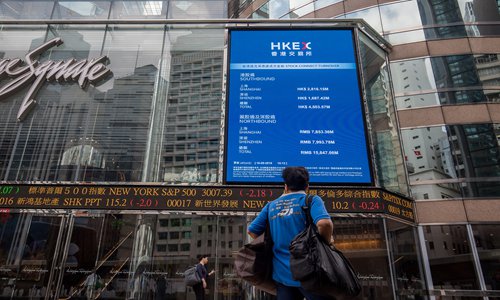HOME >> BUSINESS
HK official slams Moody’s outlook change
By Chu Daye Source:Global Times Published: 2019/9/16 23:57:21 Last Updated: 2019/9/17 10:35:00
Downgrading absurd, politically motivated: analysts

A pedestrian walks outside the Hong Kong Stock Exchange on Monday. Photo: VCG
Finance Secretary of the Hong Kong Special Administrative Region (HKSAR) Paul Chan hit back at Moody's revision of Hong Kong's credit outlook as lacking factual support, hours after the US rating firm changed the city's credit outlook, downgrading it from "stable" to "negative."The swift pushback took place as Hong Kong's monetary authority on Monday sought to allay concerns over the city's financial security, as foreign companies, including ratings agencies and hedge funds, seem to be poised to take aim at the global financial hub, which is grappling with months of political unrest.
Paul Chan said he disagrees with Moody's rationale in downgrading Hong Kong's outlook based on the presumption that recent social unrest will undercut the city's institutional advantage.
Paul Chan reiterated that the Basic Law has provided a strong safeguard for the "one country, two systems" principle and the continued prosperity of the city. He said that the financial markets and banking system were functioning well despite the chaos in the past months.
The decision by Moody's to downgrade Hong Kong's credit outlook could be politically motivated and is fundamentally flawed in its understanding of the mutually beneficial relationship between Hong Kong and the Chinese mainland, analysts said.
A seemingly coordinated effort by Western powers to short-sell Hong Kong assets seems to be unfolding. US credit ratings agency Fitch fired the first salvo earlier this month by downgrading the city's rating as a long-term foreign currency debt issuer.
In the latest development, Moody's moved one step further on Monday evening from a warning about the possible adjustment of the city's credit rating by downgrading Hong Kong's rating outlook from "stable" to "negative", saying that closer linkages with the Chinese mainland in Hong Kong's institutional framework and policymaking would lead to an erosion in the currently very high strength of Hong Kong.
It is worth noting that the reasoning by Moody's was almost identical to the factors cited by Fitch in its decision to downgrade Hong Kong's rating.
Chinese analysts said the actions by the two rating companies completely disregarded the HKSAR government's robust efforts in keeping the riots from damaging the core values of Hong Kong and in stabilizing the economy. The analysts said that some of the rationale is fundamentally flawed.
"It is absurd to classify the governance of the mainland and that of Hong Kong as two opposite things," Dong Shaopeng, an advisor for the China Securities Regulatory Commission, told the Global Times on Monday.
"A rating change cannot change the big trend of regional integration," Dong said, noting that Hong Kong benefits from interaction with the mainland.
Mei Xinyu, a research fellow with the Chinese Academy of International Trade and Economic Cooperation under the Ministry of Commerce, observed another kind of absurdity.
The US-based rating agency is saying that the chaos is causing a negative outlook, while Western politicians such as Nancy Pelosi, speaker of the US House of Representatives, are calling the chaos in Hong Kong "a beautiful sight to behold."
Concerted efforts
Some Western financial institutions and media outlets have expressed bearish views on Hong Kong, citing the political unrest while fanning the flames.
Some hedge fund managers, such as Hayman Capital Management's Kyle Bass, Crescat Capital's Kevin Smith and Trium Capital's Thomas Roderick, have also weighed in to predict that capital flight from Hong Kong might force the city to drop its currency peg against the US dollar, according to a South China Morning Post report on Monday.
The city's financial security risk is low due to the resilience of the Hong Kong economy as well as Beijing's unwavering support for the city, officials and analysts said.
Short sellers don't have the resources to break Hong Kong's markets and there have been no large-scale capital outflows from the financial center so far, said Hong Kong Monetary Authority Chief Executive Norman Chan Tak-Lam on Monday, addressing concerns ranging from a ratings downgrade by Fitch Ratings Inc to capital flight and the looming hazards of potential hedge fund attacks.
Jeff Zhang, a Hong Kong-based financial industry practitioner, said that while there is some evidence supporting investors' concerns, in general there is nothing to worry about as the HKSAR has ample ammunition and the Hong Kong stock market is stable.
Tse Kwok Leung, head of policy and economic research at Bank of China (Hong Kong), told the Global Times that Hong Kong has endured frequent challenges since the 1980s, even when the economy in the mainland was not strong enough and had a lesser influence on the Hong Kong market. He noted the significant stabilizer effect of the mainland on Hong Kong's development.
Posted in: ECONOMY